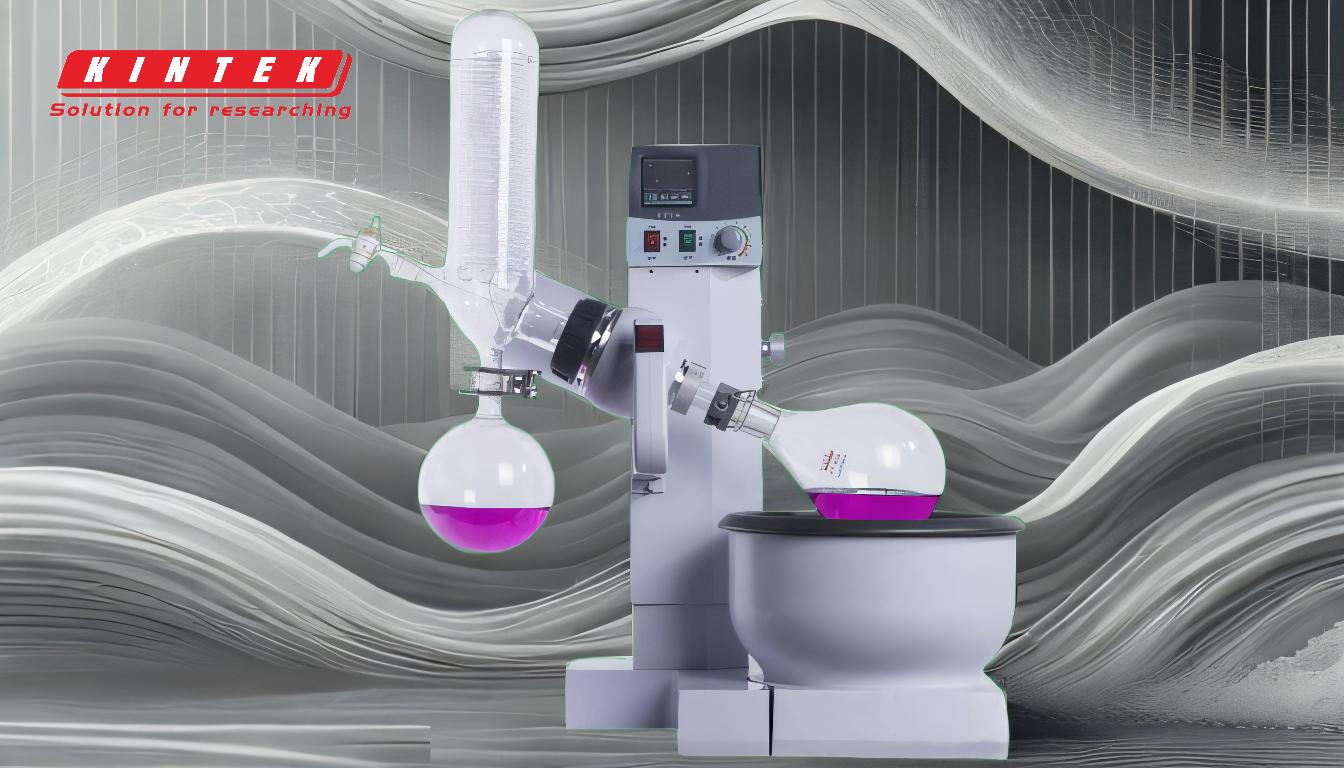A rotary evaporator, often referred to as a "rotovap," is a versatile and essential piece of equipment in organic laboratories. It is primarily used for the efficient removal of solvents from samples through evaporation, enabling processes such as concentration, drying, distillation, and purification of organic compounds. This device is particularly valuable in applications like chemical synthesis, natural product extraction, and solvent recovery, where precise control over temperature and pressure is required to avoid degrading sensitive compounds. Its ability to handle mixed solvents, perform fast distillation, and prepare samples for further analysis makes it indispensable in pharmaceutical, chemical, and bio-pharmaceutical research.
Key Points Explained:

-
Solvent Removal and Concentration:
- A rotary evaporator is primarily used to remove solvents from liquid mixtures, leaving behind a concentrated solution or solid residue. This is particularly useful in organic synthesis, where solvents are often used to dissolve reactants and products.
- The process involves rotating the sample flask under reduced pressure, which lowers the boiling point of the solvent, allowing it to evaporate at lower temperatures. This minimizes the risk of thermal degradation of heat-sensitive compounds.
-
Distillation and Purification:
- Rotary evaporators are widely used for the distillation of organic compounds. By controlling the temperature and pressure, the device can separate components of a mixture based on their boiling points.
- This is especially useful for purifying solvents or isolating specific compounds from complex mixtures, such as natural product extracts.
-
Drying and Crystallization:
- In addition to solvent removal, rotary evaporators are used for drying samples, particularly in the preparation of solid compounds for analysis or storage.
- The device can also facilitate crystallization by slowly evaporating solvents, allowing crystals to form under controlled conditions.
-
Solvent Recovery:
- Rotary evaporators are environmentally friendly tools for solvent recovery. They allow laboratories to reclaim and reuse solvents, reducing waste and costs.
- This is particularly important in industries like pharmaceuticals, where large volumes of solvents are used.
-
Applications in Chemical Synthesis:
- Rotary evaporators are integral to chemical synthesis, especially in processes like reflux and extraction. They enable the removal of solvents after reactions, leaving behind pure products.
- They are also used in the formulation of chemical mixtures and the preparation of samples for further analysis.
-
Extraction of Natural Compounds:
- In natural product research, rotary evaporators are used to extract and concentrate bioactive compounds from plant materials or other biological sources.
- The gentle evaporation process preserves the integrity of delicate compounds, making it ideal for applications in pharmacology and food science.
-
Preparation for Freeze-Drying:
- Rotary evaporators are often used as a preliminary step in freeze-drying (lyophilization). By removing the bulk of the solvent, the device reduces the time and energy required for the freeze-drying process.
-
Versatility Across Industries:
- Rotary evaporators are used in a wide range of industries, including pharmaceuticals, chemicals, bio-pharmaceuticals, and even molecular gastronomy.
- Their adaptability to various applications, from research and development to teaching and industrial production, makes them a cornerstone of modern laboratories.
-
Efficiency and Precision:
- The combination of reduced pressure, controlled heating, and continuous rotation ensures efficient and uniform evaporation, minimizing the risk of bumping or overheating.
- This precision is critical when working with volatile or heat-sensitive compounds.
-
Teaching and Research:
- Rotary evaporators are commonly used in academic settings for teaching purposes, helping students understand the principles of distillation, evaporation, and solvent recovery.
- They are also indispensable tools in research labs, enabling scientists to conduct experiments and develop new compounds with high accuracy.
In summary, a rotary evaporator is a multifunctional device that plays a critical role in organic laboratories. Its ability to perform solvent removal, distillation, drying, and concentration with precision and efficiency makes it an invaluable tool for researchers and industry professionals alike. Whether in pharmaceutical development, chemical synthesis, or natural product extraction, the rotary evaporator ensures that processes are carried out safely, effectively, and sustainably.
Summary Table:
| Application | Description |
|---|---|
| Solvent Removal & Concentration | Removes solvents, leaving concentrated solutions or solid residues. |
| Distillation & Purification | Separates compounds based on boiling points, ideal for solvent purification. |
| Drying & Crystallization | Prepares solid compounds for analysis or storage, facilitates crystal formation. |
| Solvent Recovery | Reclaims and reuses solvents, reducing waste and costs. |
| Chemical Synthesis | Removes solvents post-reaction, leaving pure products for further analysis. |
| Natural Compound Extraction | Extracts and concentrates bioactive compounds from natural sources. |
| Freeze-Drying Preparation | Reduces solvent volume, saving time and energy in freeze-drying processes. |
| Versatility Across Industries | Used in pharmaceuticals, chemicals, bio-pharmaceuticals, and molecular gastronomy. |
| Efficiency & Precision | Ensures uniform evaporation, minimizing thermal degradation of compounds. |
| Teaching & Research | Essential for academic labs and research, enabling precise experiments. |
Ready to enhance your lab's efficiency with a rotary evaporator? Contact us today to learn more!










